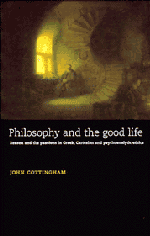1 - Philosophy and how to live
Published online by Cambridge University Press: 04 May 2010
Summary
Toute philosophic est pratique, meme celle qui paraît d'abord la plus contemplative. (‘Every philosophy is practical, even that which at first appears to be the most contemplative.’)
Jean-Paul SartreTHE PROJECT
Universae philosophiae finis est humana foelicitas (‘The goal of a complete philosophy is human happiness. ’) Eustachius a Sancto Paulo
This ambitious statement, from an early seventeenth-century textbook, the Composite System of Philosophy in Four Parts encapsulates a view of philosophy that was widespread at the time, and had a long ancestry. It has two aspects: the first, the notion of philosophy as a complete system of thought encompassing all aspects of human knowledge – metaphysical, physical and ethical – and, the second, the idea that the ultimate raison d'être of such a system is its ability to provide an authentic blueprint for human flourishing.
But can philosophy really show us how to live? The ancient Greek philosophers certainly thought it could; Descartes, the ‘father of modern philosophy’ strongly maintained as much. But in our own time, confused and conflicting answers have emerged, mostly on the negative side. It is often said that we live in the century of Freud; in the popular intellectual culture of our time, reflected in literature and drama and the media, it is psychoanalytical ideas, rather than philosophical theories, that seem to play an increasingly important role in how we try to understand ourselves and in our attempts to remove the obstacles to fulfilled and happy living.
- Type
- Chapter
- Information
- Philosophy and the Good LifeReason and the Passions in Greek, Cartesian and Psychoanalytic Ethics, pp. 5 - 28Publisher: Cambridge University PressPrint publication year: 1998



